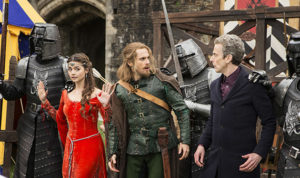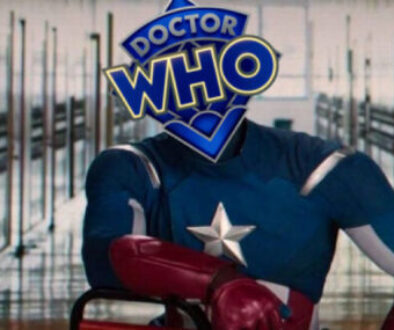2nd Opinion: Robot of Sherwood
David Selby and John Hussey both give their own verdict on the 3rd episode.
David’s Verdict
 Although I’ve generally disliked Moffat’s approach on the Doctor, both The Time of the Doctor and the first episodes of Series Eight have led me to questioning whether I’d been doing him a discredit. Whilst no longer the archetypal Byronic hero I’d always envisaged him as, Capaldi’s era thus far has sought to morally and psychologically explore the Doctor from a number of literarily conventional and/or unorthodox standpoints.
Although I’ve generally disliked Moffat’s approach on the Doctor, both The Time of the Doctor and the first episodes of Series Eight have led me to questioning whether I’d been doing him a discredit. Whilst no longer the archetypal Byronic hero I’d always envisaged him as, Capaldi’s era thus far has sought to morally and psychologically explore the Doctor from a number of literarily conventional and/or unorthodox standpoints.
Robot of Sherwood provides another perspective on the Doctor; that of a debatable hero-figure, and explores this one a more light-hearted backdrop of a traditionally adventurous and mythic setting. Many of the exchanges between the Doctor and Robin are engrossing and, actually, thought-provoking – both are somewhat idealistic in what they strive to do, but are admirable because they aim for a perhaps naïve good in a world of corruption. So as much as Robot of Sherwood was an episode ‘for the kids’ in its setting and premise, it served as reassurance to all the younger viewers who looked up to the Doctor as their delivering hero that he was still the man they thought he was.
I’m not going to be as uncompromising as to say that I don’t enjoy Doctor Who bucking the trend and just having a bit of fun for a change, but it was a senseless slot as per previously with Into the Dalek. Two weeks in, past the obligatory ‘new Doctor’ starters, there’s an episode installed for the purpose of being a tonal break. Yet, arguably, there’s nothing to break from. The series doesn’t get underway with its own wholly distinctive plotlines until Listen, and therefore I begin to question the point in having the ‘fun’ episode so early in the series.
What I could appreciate was the subtle continuation of darker themes overall. I was initially concerned that Robot of Sherwood would end up tonally-awkward, but as the episode was still majorly set at night and utilised a villain who was often a lot nastier than we’re used to – not dissimilar, in fact, to last year’s Solomon from Dinosaurs on a Spaceship. Granted, Miller’s Sheriff was on the tawdry side, but in all the right ways. Part of the Robin Hood crossover was, unavoidably, to indulge in the clichés.
Unfortunately there’s little to say for the plot itself. It’s essentially the same storyline as Deep Breath, simply coated in a different atmosphere and locale. It makes for an ultimately weaker overall story, as an individually one-off idea, the Doctor meeting a fictional hero, doesn’t get its own notable plot.
It’s far from a bad story and will, I’m sure, grow on me when it comes to the inevitable re-watch, much as Gatiss’ The Crimson Horror from the last series did too. I’m still concerned about the direction of the series under forty-five minute episodes with no two-parters but Robot of Sherwood seemed to mostly confirm that Doctor Who is still able to tell a decent story in that time. Sherwood was hardly my favourite episode, but I don’t think it would be unfair to conclude that, like it or loath it: it was what it was.
John’s Verdict
 Mark Gatiss delivered another great addition to the Whoniverse and even went as far as coming out of his shell and presenting us with something different to his usual themes and tones. I found the story was very light-hearted compared to previous Gatiss scripts and it formed a fun, enjoyable adventure. The incorporation of Robin Hood brought a fresh feeling to the show and allowed for a brilliant story that held all the typical Robin Hood clichéd moments, such as the splitting the bow during an arrow tournament.
Mark Gatiss delivered another great addition to the Whoniverse and even went as far as coming out of his shell and presenting us with something different to his usual themes and tones. I found the story was very light-hearted compared to previous Gatiss scripts and it formed a fun, enjoyable adventure. The incorporation of Robin Hood brought a fresh feeling to the show and allowed for a brilliant story that held all the typical Robin Hood clichéd moments, such as the splitting the bow during an arrow tournament.
The best part of the story for me was the Twelfth Doctor’s attitude towards Robin Hood and his continuous crusade to unveil him as a fake hero. This brought hilarity left, right and centre and granted the Twelfth Doctor some breathing space from his darker nature to allow for some comedic moments to help mellow him out. Tom Riley’s performance as Robin was perfect and really gave a refreshing interpretation to the legendary character that he clearly enjoyed doing. Peter Capaldi played off against Riley with precision and the two of them delivered a fun rivalry and some great banter. The whole competition during the tournament for example showed off a childish nature within the Twelfth Doctor that showcased his inability to be outclassed and shown up. He even went to compete against Hood throughout the dungeon scenes in order to outdo him, ultimately resorting to insults and boasts.
The story of ‘Robot of Sherwood’ told about how the Doctor perceives himself. He’s never seen himself as a hero, not even during the Last Great Time War. The Doctor is simply an adventurer who journeys through time and space with a goal of rescuing those in need whenever he can but never once asks for praise. The Tenth Doctor is a great example of this notion as he would never be disappointed in the idea of nobody knowing he’d saved the day and in some ways was glad to know this. The Doctor doesn’t like a fuss and prefers to be undetected and left under the radar doing his own thing. This way of thinking perhaps best describes his bitter nature towards believing in such a hero like Robin Hood because to him heroes don’t truly exist.
This line of thinking made the Twelfth Doctor become blind of the truth as he continuously came up with mad theories as to who Robin Hood was and the Sheriff of Nottingham’s motives. It was a wake-up call moment to see the villain of the story actually call the Doctor out on theorising an idiotic idea to best fit around the Time Lord’s own way of thinking. The Doctor wanted to see his theory come true to the point that he became absent somewhat to the dangers around him and forced Clara to step up and investigate the Sheriff’s sinister plans for Britain. It was obvious that Clara would be chosen for interrogation by the Sheriff over the Doctor due to his lack of maturity. During the moment Clara was taken the Doctor seemed to imply he was more bothered about the fact he wasn’t chosen rather than Clara’s safety being threatened.
One of the Twelfth Doctor’s strongest traits is his hatred of being wrong in front of others. His only concern upon losing the jail key was Clara seeing him make the blundering. It also made his determination over Robin Hood’s truth all the more meaningful as he wanted to prove himself right above others, a further indication that the Twelfth Doctor likes to stand above other’s and doesn’t like to dwell or understand the human mind, i.e. Clara’s belief in Robin Hood and his idealistic as a hero.
 The revelation of Clara’s belief in the Doctor was the final pay-off of the story and really brought about new depths within their chemistry. It made her admiration over Robin have better meaning as the idea of a legendary hero reflected back to how she perceived her best friend. This idea adds on top of the notion of whether or not the Twelfth Doctor is a good man. The interesting story-arc pushes the Twelfth Doctor forward and perhaps one step closer in helping him find himself as a character. Speaking of Clara, I found her contribution to the story this week allowed her to really shine and showcase her brilliant character. Like with the Half-Face Man in ‘Deep Breath’ she used a psychological game against her enemy in order to find out important facts. She proved her bravery and her ability to use her head in a dangerous situation.
The revelation of Clara’s belief in the Doctor was the final pay-off of the story and really brought about new depths within their chemistry. It made her admiration over Robin have better meaning as the idea of a legendary hero reflected back to how she perceived her best friend. This idea adds on top of the notion of whether or not the Twelfth Doctor is a good man. The interesting story-arc pushes the Twelfth Doctor forward and perhaps one step closer in helping him find himself as a character. Speaking of Clara, I found her contribution to the story this week allowed her to really shine and showcase her brilliant character. Like with the Half-Face Man in ‘Deep Breath’ she used a psychological game against her enemy in order to find out important facts. She proved her bravery and her ability to use her head in a dangerous situation.
Ben Miller gave one hell of a performance as the Sheriff, giving off a true menace to the character added with the unpredictability of his behaviour. His character was certainly showcased as an evil tyrant through both his scene of killing an innocent man and during his scene with Clara as he tried taking advantage of her. He was a true piece of work which you couldn’t help both hating and loving at the same time, a certain charm Miller has with his acting. The robots were incorporated into the story rather well. Though they proved to be an unoriginal foe for the Doctor to face, especially since the Clockwork Droids had only appeared a couple of stories earlier, they still allowed for some very menacing scenes especially when they killed one of the slaves due to his inability to work anymore.
I loved how the story-arc was slotted in with a quick appearance just to remind the viewer of the bigger picture of the series with the Twelfth Doctor actually acknowledging it rather early on within the series. This was a better approach to getting the audience interest I found as the Doctor himself was pointing us towards something of interest and worry. What exactly does this so-called Promised Land mean, why is everyone suddenly interested within it and what does it entail? This is something I can’t wait to see unfold and answered throughout the series.








